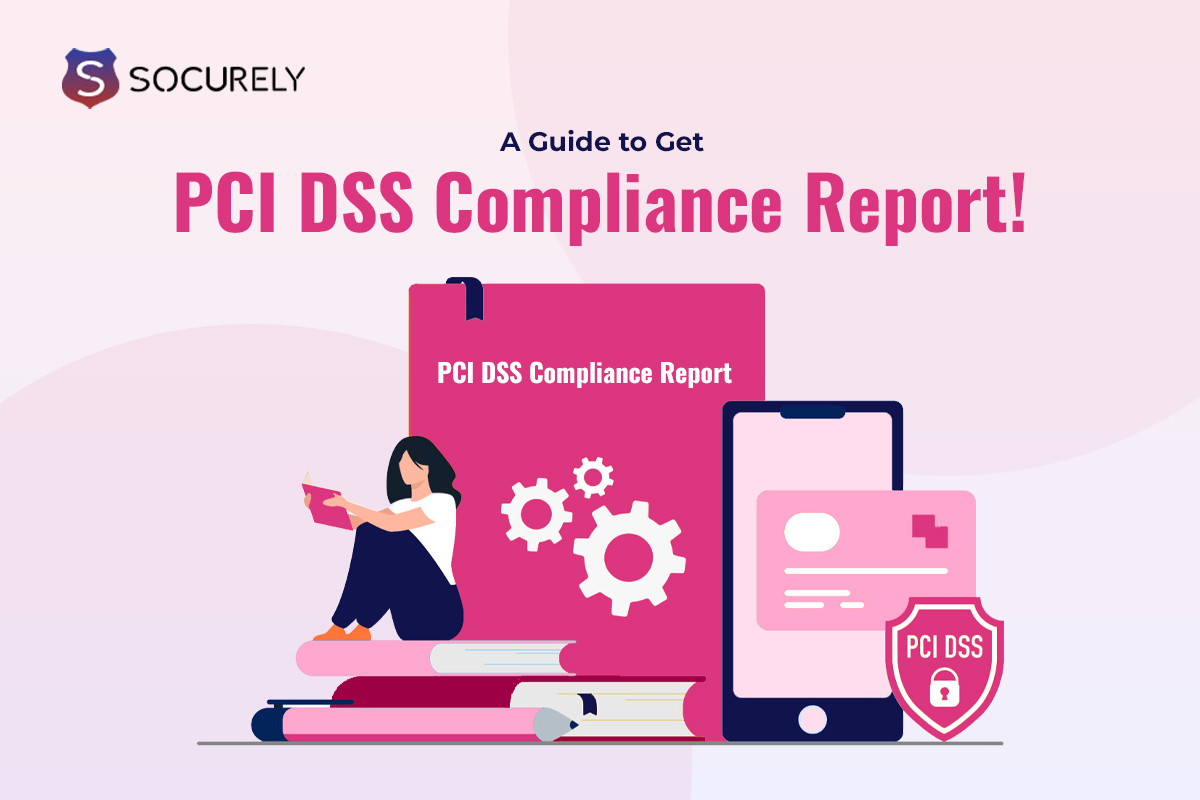Did you know that in 2023, the average cost of a data breach reached a staggering $4.45 million? Additionally, 74% of all breaches involved external actors, primarily organized crime groups targeting payment card data.
The report states the need for PCI DSS compliance. It also estimates that businesses without PCI DSS Compliance can end up with data breaches, loss of reputational damage, security breaches, and more.
In reality, the PCI DSS report not only safeguards sensitive payment information but also ensures your business meets industry standards.
In this comprehensive guide, we’ll explore the steps, requirements, benefits, and costs associated with obtaining a PCI DSS Audit Report.
- A Gist Of The Web Blog-
- Goal- Recognize the significance of the PCI DSS report and the procedures involved in obtaining it.
- Reach- Acquire knowledge regarding the importance of PCI compliance, the certification process, and related expenses.
- Result- Obtaining the PCI DSS report to safeguard client information, foster confidence, avert fines, and enhance commercial prospects.
What Is the PCI DSS Report?
Small businesses could spend $5,000-$20,000 for a report, while larger enterprises might need to pay $70,000+.
PCI DSS (Payment Card Industry Data Security Standards) certification is developed by PCI SSC. It is a global security standard, which includes extensive policies and processes. It is a safety requirement for card transactions. This report of security standards is designed to ensure that all companies that process, store, or transmit credit card information maintain a secure environment. The PCI DSS Certification helps organizations protect cardholder data, enhance security, and build customer trust.
To become PCI DSS Compliant for small and large businesses, understanding the importance of PCI DSS reports is important.
The PCI DSS (Payment Card Industry Data Security Standards) certification includes various levels over 12 months. These levels offer precise specifications and validation procedures to achieve compliance.
Why is PCI DSS Certification Important?
Achieving PCI DSS Certification is crucial for several reasons:
- Security: It helps in safeguarding sensitive payment card information.
- Trust: It builds customer confidence in your payment processing capabilities.
- Compliance: It ensures you meet regulatory requirements and avoid hefty fines.
- Reputation: It enhances your business’s reputation as a secure and trustworthy entity.
Steps To Get PCI DSS Report
- Get Familiar with 12 PCI DSS Requirements
- Determine the Scope
- Understand And Identify Your Company Needs
- Conduct A Gap Analysis
- Develop and Implement Necessary Security Measures
- Go Through The Documentation and Policies
- Give Your Employees Proper Training
- Conduct a Risk Assessment
- Perform Internal Audits
- Engage In A Qualified Security Assessor (QSA)
- Complete the Attestation of Compliance (AOC)
PCI DSS Requirements:
PCI DSS is composed of 12 requirements designed to protect cardholder data. Other critical protective measures include security management, policies, procedures, network architecture, and software design.
Determining Scope:
Determine which parts of your business environment are involved in storing, processing, or transmitting cardholder data. This helps in identifying the scope of the compliance efforts and focusing resources where they are most needed.
Understanding Company Needs and Gap Analysis
Conduct a thorough assessment of your company’s current security posture against the PCI DSS Requirements. This gap analysis will help identify areas that need improvement to meet the standards.
- Company Needs: Understand what specific security needs your company has based on its size, structure, and the type of cardholder data it handles.
- Gap Analysis: Identify the discrepancies between your current practices and PCI DSS standards. This will provide a roadmap for what needs to be addressed to achieve compliance.
Understanding the PCI DSS Compliance Levels is required to identify the company’s needs. It adds to the online transactions your cloud environment processes annually.
- Level 1 Compliance: Annual Transactions Over 6 Million
- Level 2 Compliance: Annual Transactions: 1 million to 6 million
- Level 3 Compliance: Annual Transactions: 20,000 to 1 million
- Level 4 Compliance: Less than 20,000 transactions annually
For instance, if your cloud-hosted business is subject to level 1 compliance, you must engage the services of a PCI-qualified security assessor (QSA) to carry out a PCI DSS Audit and determine whether your business complies with the necessary PCI data security standard. An annual compliance report (ROC) submission is another requirement for your business processes.
In addition, if your organization complies with levels 2 or 3, you are required to complete a Self-Assessment Questionnaire (SAQ).
Even if your cloud-hosted business is classified as compliance level 4, it is still advised that you complete the SAQ. While it’s not required, doing so will help you along the PCI DSS report path.
Developing and Implementing Security Measures
Implement the necessary security measures to close the gaps identified. This includes:
- Secure Network: Provide cardholder data protection by installing and maintaining a firewall.
- Encryption: Protect cardholder information while in transmission and storage with strong cryptography.
- Access Control: Implement robust access control measures to restrict access to cardholder data on a need-to-know basis.
Documentation and Policies
Create detailed documentation of your security policies and procedures. This documentation is crucial for demonstrating compliance and is a key component of the PCI DSS Certification process.
- Security Policies: Develop and document security policies that align with PCI DSS Requirements.
- Procedures: Document procedures for monitoring and maintaining security controls.
Employee Training
Train your employees on PCI DSS Requirements and security best practices. Regular training ensures that all staff members understand their roles in maintaining compliance and protecting cardholder data.
Conduct a Risk Assessment
Perform a comprehensive risk assessment to identify potential threats and vulnerabilities to your cardholder data environment. To reduce the risk of these issues, implement risk mitigation strategies.
Perform Internal PCI DSS Audits
Regular internal PCI DSS audits are essential to ensure ongoing compliance with PCI DSS standards. These audits help in identifying areas of non-compliance and addressing them promptly.
Self-Assessment Questionnaires (SAQs)
Depending on your business size and type, complete the appropriate SAQ to assess your compliance level.
Merchants can verify their self-assessment replies with the use of SAQs. Larger businesses frequently hire qualified security assessors (QSAs) to help them properly evaluate their compliance.
A one-year-valid ROC is only intended for level-one firms that are conducting security audits.
Engage a Qualified Security Assessor (QSA)
Hire a QSA to perform a formal assessment of your compliance with PCI DSS Requirements. The QSA will validate your efforts and provide an official report on compliance status.
Complete the Attestation of Compliance (AOC)
After the QSA assessment, complete the AOC, which is a formal declaration of your compliance status. Submit this document to the relevant acquiring banks and card brands.
Top Benefits Of PCI DSS Compliance
- Enhanced Security: Achieving PCI DSS compliance ensures your business has robust security measures in place, protecting sensitive cardholder data from breaches and cyberattacks. This reduces the risk of data theft and enhances overall security posture.
- Customer Trust: The PCI DSS Audit report demonstrates your commitment to safeguarding customer information and building trust and confidence. Customers are more likely to choose businesses they believe are secure and compliant with industry standards.
- Regulatory Compliance: Meeting PCI DSS requirements helps your business comply with various regulations and legal requirements related to data security. This reduces the risk of fines and legal penalties associated with non-compliance.
- Reduced Fraud: By implementing stringent security controls as part of PCI DSS compliance, your business can significantly reduce the incidence of payment card fraud. This leads to fewer fraudulent transactions and associated losses.
- Competitive Advantage: PCI DSS Report can set your business apart from competitors who may not be certified. It shows your dedication to security, potentially attracting more customers and business partners.
- Operational Efficiency: The process of achieving PCI DSS compliance often leads to improved operational processes and security practices. This can enhance efficiency, streamline operations, and reduce security incidents.
- Reputation Management: Maintaining PCI DSS compliance helps protect your business’s reputation by minimizing the risk of data breaches. A strong security posture can prevent negative publicity and maintain your brand’s integrity.
- Global Acceptance: PCI DSS report is recognized worldwide, making it easier for your business to expand into new markets. International customers and partners will appreciate your adherence to global security standards.
What is the PCI DSS report duration?
Obtaining a PCI DSS report can take one to two weeks. Everything hinges on how long it takes to pass the PCI scan and finish the self-assessment questionnaire.
Payment processing card companies are notified by your merchant bank when you pass both tests.
What is the cost of PCI DSS reports?
The cost of PCI DSS reports depends on various factors, including:
- Business Size: Larger organizations may face higher costs due to more extensive assessments.
- Scope of report: The number of systems and processes involved can affect the cost.
- Engagement of QSAs: Hiring qualified security assessors can be a significant expense.
On average, small businesses can expect to spend between $5,000 to $50,000, while larger enterprises may incur costs ranging from $50,000 to $200,000 or more.
How do you prove PCI DSS reports to your customers?
- Compliance Certificate: Display your PCI DSS Compliance certificate on your website and your business premises.
- Security Seal: Use a PCI DSS-compliant security seal on your payment pages to assure customers of their data security.
- Communication: Inform customers through emails, newsletters, and social media about your PCI DSS reports to build trust.
What’s Next?
Achieving PCI DSS Certification is a significant step towards securing your payment systems and building customer trust. However, compliance is an ongoing process that requires regular assessments and updates to your security measures.
Get PCI DSS Report With Socurely
At Socurely, we specialize in guiding businesses through the PCI DSS Compliance process. Our team of experts will help you understand PCI DSS Requirements, develop robust security measures, and achieve reports efficiently. Partner with us to secure your payment systems and enhance your business reputation.
FAQs
What are the main goals of PCI DSS?
- The primary goals are to secure cardholder data, maintain a secure network, implement strong access control measures, and monitor and test networks regularly.
Can small businesses achieve PCI DSS Certification?
- Yes, PCI DSS Certification is achievable for businesses of all sizes with the right guidance and resources.
What occurs if your PCI report is revoked?
- In the unlikely event of a data breach, you will have to pay a mountain of fines and penalties if you lose your PCI report. It will impact your business partnerships as well. Your bank, the credit card firms you deal with, and other critical payment processors may have issues if you lose your PCI report. Generally, they prefer not to conduct business with a firm that isn’t PCI compliant for any one transaction.
Why are PCI DSS policies more important than they should be?
- Any organization’s information security management system is built on its policies. To put it simply, they are written declarations of your intentions. To set expectations and accomplish your goals, you must share your policies with your workforce. Additionally, you communicate these policies with potential clients and consumers to show them how committed you are to doing morally, which fosters confidence.
Conclusion
Obtaining PCI DSS Compliance is essential for securing your payment systems and building customer trust. By following the steps outlined in this guide, you can achieve a report and enjoy the numerous benefits it offers. Partner with Socurely to streamline the audit report process and ensure your business stays ahead of cyber threats.







